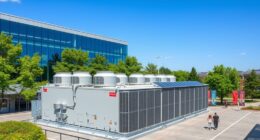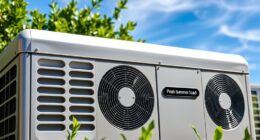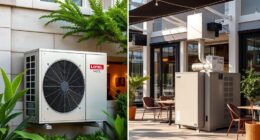We have all experienced the pain of soaring energy bills. But what if there was a way to lower costs without sacrificing comfort in our homes and workplaces? This is where energy-efficient heat pumps come in handy.
These amazing devices use cutting-edge technology to provide both heating and cooling, all while using less energy. In this article, we’ll decode the secrets behind these heat pumps, explore their benefits, and address common concerns.
Get ready to discover a cost-effective solution that will keep you cozy and save you money.
Key Takeaways
- Energy-efficient heat pumps reduce energy consumption and lower utility bills, providing substantial cost savings for homeowners and businesses.
- They have a positive environmental impact by reducing greenhouse gas emissions, energy consumption, and carbon footprint.
- Proper sizing and installation of heat pumps are crucial for maximizing their benefits in residential and commercial settings.
- Rebates and incentives are available to make the investment in energy-efficient heat pumps more financially beneficial, and eligibility requirements should be reviewed and consulted with local utility companies or government agencies.
How Energy-Efficient Heat Pumps Save Money in Homes and Businesses
In our homes and businesses, energy-efficient heat pumps save money by reducing energy consumption and lowering utility bills. These innovative appliances operate by transferring heat from one area to another, rather than generating it from scratch. By doing so, they use significantly less electricity compared to traditional heating systems. This results in substantial cost savings for homeowners and businesses alike.
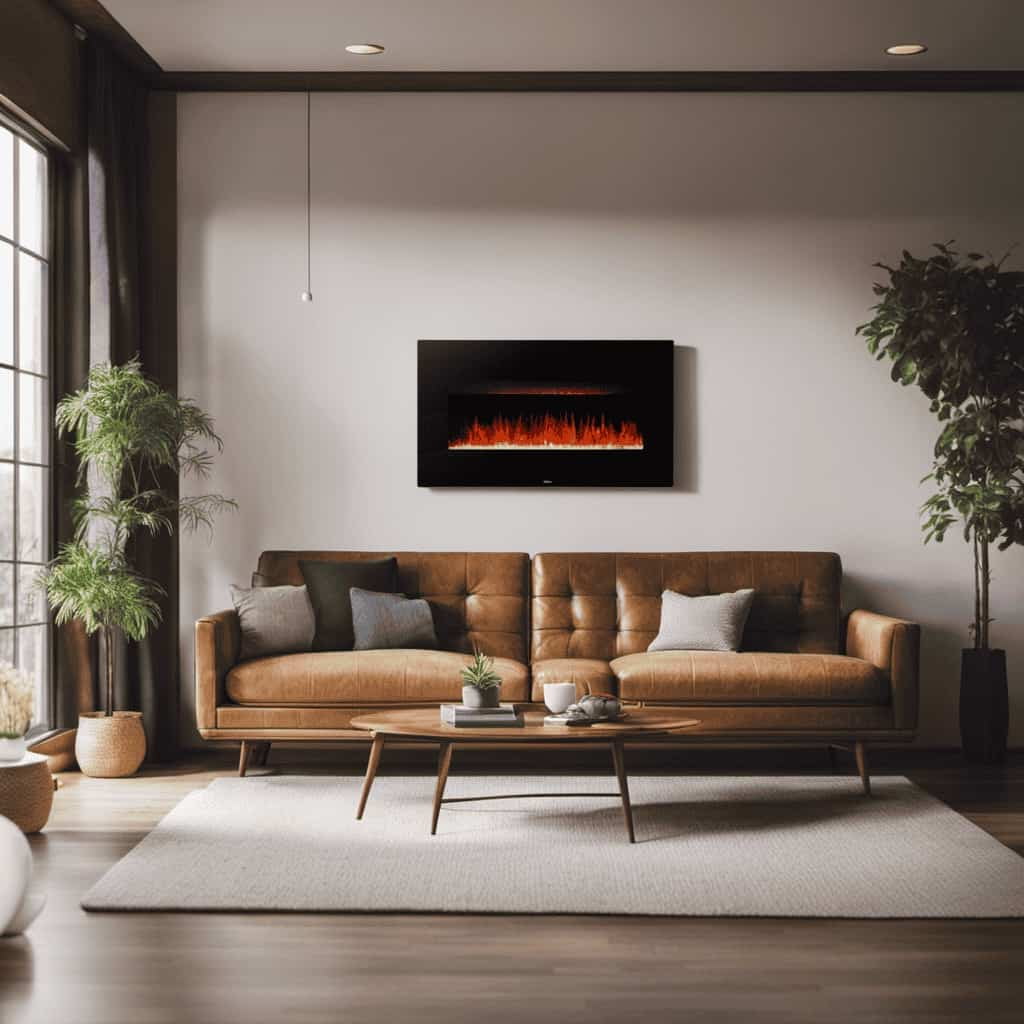
Additionally, energy-efficient heat pumps have a positive environmental impact. They reduce greenhouse gas emissions by using renewable energy sources such as air, water, or the ground to heat or cool spaces. This not only helps combat climate change but also promotes a healthier and more sustainable future.
With the increasing focus on energy conservation and environmental responsibility, energy-efficient heat pumps are an excellent choice for those seeking to save money while reducing their carbon footprint.
The Benefits of Energy-Efficient Heat Pumps for Residential and Commercial Applications
We have identified three key benefits of energy-efficient heat pumps for residential and commercial applications.
The first benefit is energy savings. Energy-efficient heat pumps are designed to use less energy compared to traditional heating and cooling systems, resulting in lower utility bills for homeowners and businesses.

The second benefit is the positive environmental impact. By reducing energy consumption, energy-efficient heat pumps help to decrease greenhouse gas emissions and lessen the carbon footprint. This makes them an environmentally friendly choice for those who want to contribute to a more sustainable future.
Lastly, energy-efficient heat pumps provide consistent and comfortable heating and cooling throughout the year. They’re able to maintain a steady temperature, ensuring a comfortable indoor environment for occupants.
Understanding the Technology Behind Energy-Efficient Heat Pumps
Our understanding of the technology behind energy-efficient heat pumps is crucial for maximizing their benefits in residential and commercial settings. To fully grasp these advanced systems, it’s important to comprehend the principles of heat transfer and energy conversion that underpin their operation.
Here are two key aspects to consider:
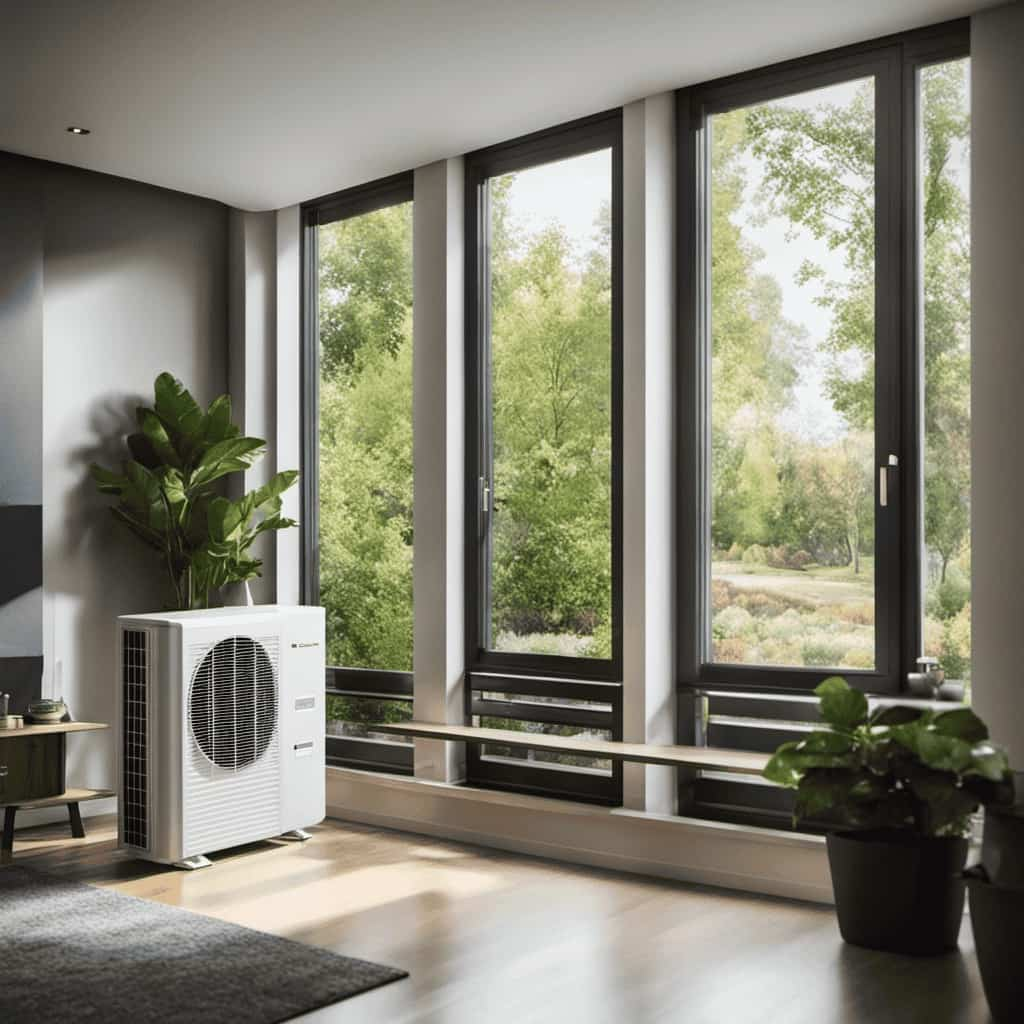
-
Understanding heat transfer:
-
Heat pumps utilize the principle of transferring heat from one area to another using refrigerants.
-
The refrigerant absorbs heat from a low-temperature source (such as outdoor air or the ground) and releases it at a higher temperature indoors.
-
Energy conversion:

-
Heat pumps employ mechanical work to move heat against its natural flow.
-
This conversion process involves the use of compressors and refrigeration cycles to increase the temperature of the transferred heat.
Choosing the Right Size and Capacity for Energy-Efficient Heat Pumps in Home and Business
When it comes to choosing the right size and capacity for energy-efficient heat pumps in our homes and businesses, there are a few important considerations to keep in mind.
First, the size of the heat pump should be appropriate for the space it will be heating or cooling, as an improperly sized unit can result in inefficiency and increased energy consumption.

Additionally, it’s crucial to determine the capacity requirements based on the specific needs of the building, taking into account factors such as insulation, climate, and usage patterns.
Size Considerations for Efficiency
Choosing the correct size and capacity of energy-efficient heat pumps is crucial for maximizing efficiency in both residential and commercial settings. When considering the size and capacity of a heat pump, there are several important factors to take into account:
-
Climate considerations:
-
The heat pump should be sized appropriately to meet the heating and cooling demands of the specific climate where it will be installed.

-
Factors such as temperature extremes, humidity levels, and insulation quality should be considered when determining the size and capacity needed.
-
Building size and layout:
-
The square footage of the building and the number of rooms will influence the size and capacity required.
-
The layout of the building, including the number and location of windows and doors, should also be considered.

Capacity Requirements for Effectiveness
To ensure optimal efficiency, it is important to accurately determine the appropriate size and capacity of energy-efficient heat pumps for residential and commercial settings. When it comes to capacity requirements, there are several factors to consider. First and foremost, you need to assess the heating and cooling needs of your space. This involves considering factors such as the size of the area, insulation levels, and the number of occupants or equipment that generate heat. Additionally, you should also take into account any potential future expansion or changes in the space that might affect the heat pump’s capacity requirements. By carefully evaluating these sizing considerations, you can choose the right size and capacity for your energy-efficient heat pump, ensuring optimal performance and energy savings. To help you understand these considerations better, take a look at the table below:
| Capacity Requirements | Sizing Considerations |
|---|---|
| Heating and cooling needs of the space | Size of the area |
| Insulation levels | Number of occupants or equipment generating heat |
| Future expansion or changes in the space | |
Home Vs Business Needs
We must consider the specific needs of homes and businesses in order to determine the appropriate size and capacity for energy-efficient heat pumps. When it comes to home needs, factors such as the size of the house, insulation levels, and climate play a crucial role in determining the right size and capacity of a heat pump. Additionally, the number of occupants and their comfort preferences should also be taken into account.
On the other hand, business requirements for heat pumps may differ significantly. The size and layout of the building, the type of business, and the specific heating and cooling demands are all important considerations. For example, a retail store with large windows may require a more powerful heat pump to combat heat gain, while a small office with limited space may need a compact and efficient unit.
Installation and Maintenance Tips for Energy-Efficient Heat Pumps
First, let’s cover the three essential installation and maintenance tips for energy-efficient heat pumps.

When it comes to installation, it’s crucial to hire a professional technician who’s experienced in heat pump systems. They’ll ensure proper sizing, placement, and connection of the unit.
Maintenance is equally important to ensure the optimal performance and longevity of your heat pump. Regularly cleaning or replacing the air filters is essential to maintain good airflow and prevent dust buildup. Additionally, inspecting and cleaning the outdoor unit, checking for refrigerant leaks, and lubricating moving parts are essential maintenance tasks.
Lastly, scheduling annual professional maintenance checks will help identify and address any potential issues before they become major problems.
Improving Indoor Air Quality With Energy-Efficient Heat Pumps
With energy-efficient heat pumps, we can effectively improve indoor air quality. These heat pumps offer several benefits that contribute to a healthier and more comfortable living environment. Here are some ways in which energy-efficient heat pumps can enhance indoor air quality:

-
Filtration: Heat pumps are equipped with advanced filtration systems that can trap and remove airborne particles, such as dust, pollen, and pet dander. This helps to reduce indoor allergens and improve overall air quality.
-
Ventilation: Heat pumps can also provide controlled ventilation, bringing in fresh outdoor air and expelling stale indoor air. This helps to remove odors, moisture, and indoor pollutants, ensuring a constant supply of clean air.
-
Energy Savings: By efficiently heating or cooling the air, energy-efficient heat pumps can reduce the need for other appliances that may contribute to indoor air pollution. This not only improves air quality but also leads to energy savings.
Exploring the Rebates and Incentives for Energy-Efficient Heat Pumps in Home and Business
Let’s explore the financial benefits of rebates and the eligibility requirements for incentives when it comes to energy-efficient heat pumps in home and business.

These rebates and incentives can significantly reduce the cost of purchasing and installing a heat pump, making it a more affordable option for homeowners and businesses.
However, it’s important to understand the specific criteria and qualifications needed to qualify for these financial incentives.
Financial Benefits of Rebates
We can maximize our financial benefits by taking advantage of the available rebates and incentives for energy-efficient heat pumps in home and business. These incentives can lead to significant financial savings for individuals and organizations.
Here are two key points to consider:

-
Financial Savings: By installing energy-efficient heat pumps, we can reduce our energy consumption and lower our utility bills. The savings can add up over time, resulting in significant cost reductions.
-
Government Incentives: Many governments and utility companies offer rebates and incentives to promote the adoption of energy-efficient technologies. These incentives can cover a portion of the upfront costs of purchasing and installing heat pumps, making them more affordable.
By understanding and utilizing these rebates and incentives, we can make our investment in energy-efficient heat pumps even more financially beneficial.
Now, let’s explore the eligibility requirements for these incentives.
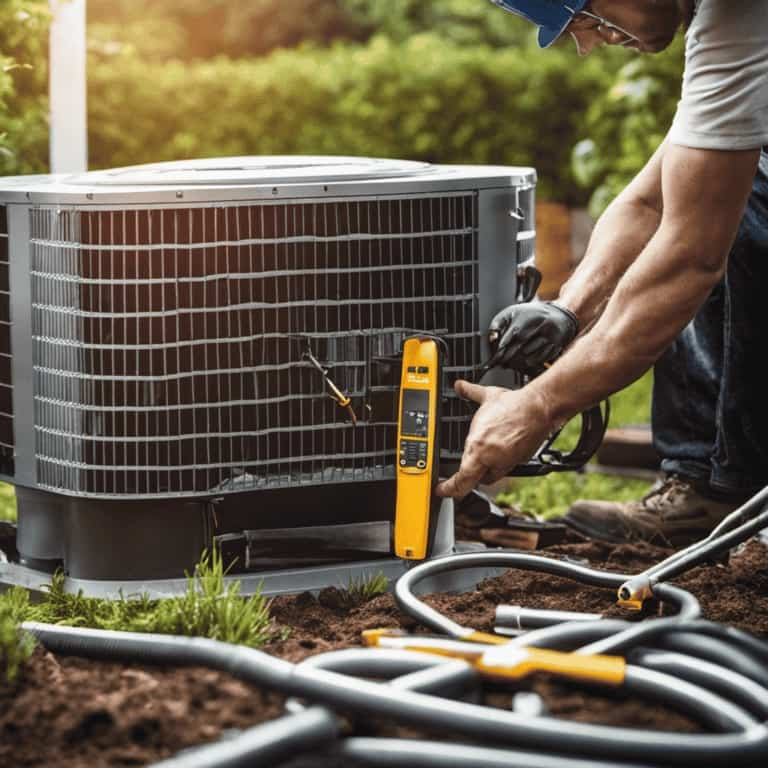
Eligibility Requirements for Incentives
To qualify for the rebates and incentives for energy-efficient heat pumps in home and business, certain eligibility requirements must be met. Incentive program details and eligibility criteria for rebates vary depending on the specific program and location.
Typically, eligibility is based on factors such as the type of heat pump installed, its energy efficiency rating, and the size of the system. Additionally, some programs may require professional installation by a certified contractor.
It’s important to note that eligibility requirements can change over time, so it’s essential to review the latest program guidelines and criteria. To ensure eligibility, it’s recommended to consult with local utility companies or government agencies that administer the incentive programs.
Addressing Common Concerns and Misconceptions About Energy-Efficient Heat Pumps
Many homeowners and business owners have concerns and misconceptions about energy-efficient heat pumps. It’s important to address these concerns and provide accurate information to help them make informed decisions.
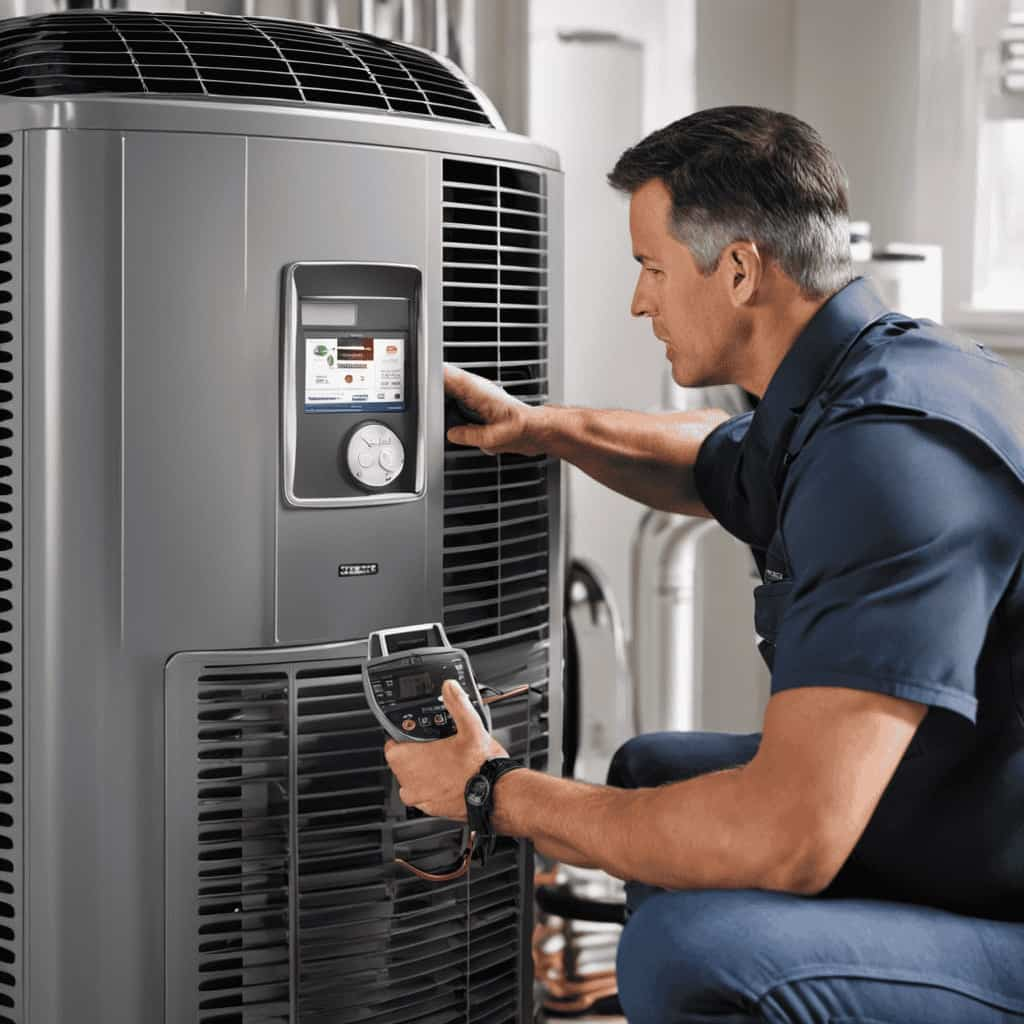
Here are some common misconceptions and the truth about energy savings with heat pumps:
-
Misconception 1: Heat pumps aren’t effective in cold climates.
-
Truth: Modern heat pumps are designed to work efficiently even in cold temperatures, providing reliable heating throughout the year.
-
Misconception 2: Heat pumps aren’t cost-effective.

-
Truth: While heat pumps may have a higher upfront cost compared to traditional heating systems, their energy savings over time can offset this initial investment, leading to long-term cost savings.
Frequently Asked Questions
How Much Can I Expect to Save on My Energy Bills by Using an Energy-Efficient Heat Pump in My Home or Business?
We can save a significant amount on energy bills by using energy-efficient heat pumps in our homes or businesses. These pumps reduce energy consumption, resulting in cost savings over time.
Are Energy-Efficient Heat Pumps Suitable for Both Residential and Commercial Applications?
Energy-efficient heat pumps are suitable for both residential and commercial applications. They offer cost-effective performance in both settings, providing energy savings and comfort. Their versatility makes them a great choice for any heating and cooling needs.
How Do Energy-Efficient Heat Pumps Work to Provide Both Heating and Cooling?
Heat pump technology efficiently transfers heat from one place to another, allowing heat pumps to provide both heating and cooling. This versatility, along with their energy efficiency, makes heat pumps an advantageous option for both residential and commercial applications.
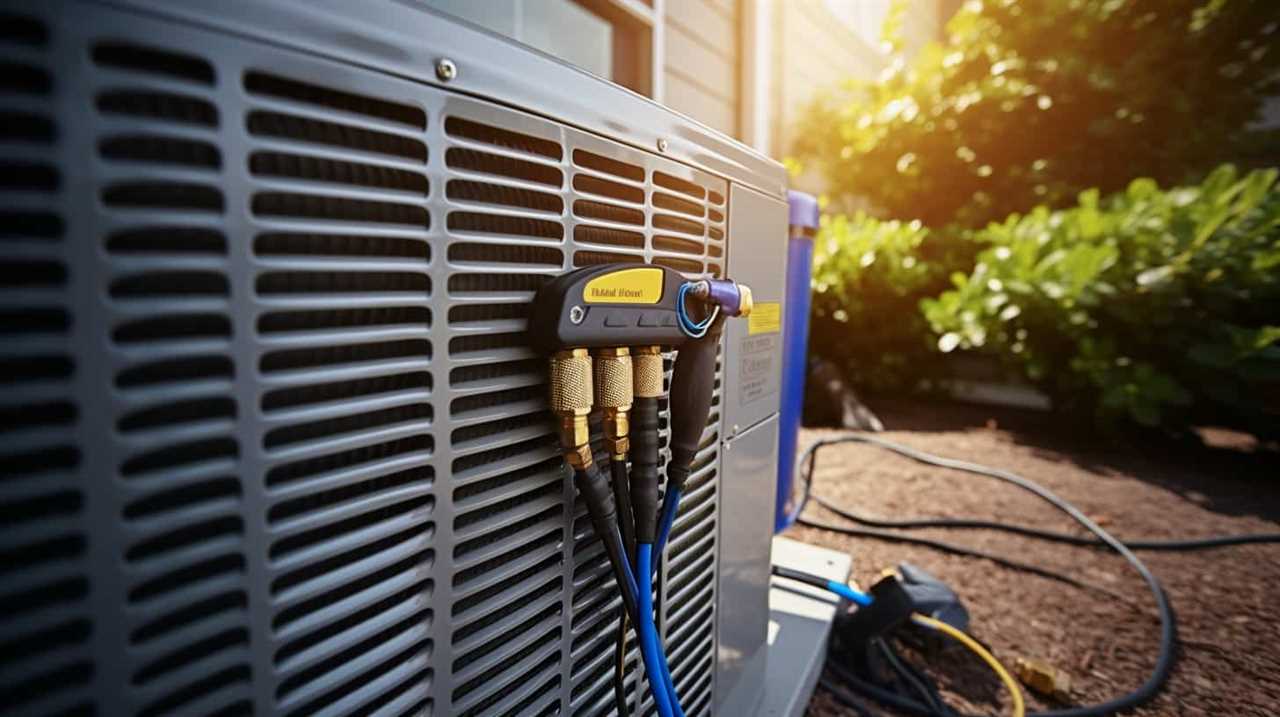
What Factors Should I Consider When Determining the Right Size and Capacity for an Energy-Efficient Heat Pump for My Home or Business?
When determining the right size and capacity for an energy-efficient heat pump, we need to consider various factors such as the square footage of the space, insulation, climate conditions, and desired temperature range.
What Regular Maintenance Tasks Are Required to Keep an Energy-Efficient Heat Pump Operating Efficiently?
Regular maintenance tasks are essential to keep an energy-efficient heat pump operating efficiently. By following maintenance tips and improving efficiency, we can maximize performance and achieve energy savings with our energy-efficient heat pump maintenance.
Conclusion
In conclusion, energy-efficient heat pumps offer a cost-effective solution for both residential and commercial spaces. By harnessing the technology behind these pumps, users can enjoy savings on their energy bills while improving indoor air quality.
It’s important to choose the right size and capacity for optimal performance, and regular maintenance ensures longevity.

With rebates and incentives available, now is the time to consider switching to energy-efficient heat pumps for a more sustainable and comfortable environment.






